Rivian dual vs. quad, electric VW GTI, Sonata Hybrid and Model 3 refreshes: The Week in Reverse
Which electric trucks slated for delivery later this year confirmed an EPA range topping 400 miles?
Does EV fast-charging degrade the long-term range of Teslas?
This is our look back at the Week In Reverse—right here at EV kind of cars—for the week ending September 3, 2023.
Rivian’s Enduro motor unit, made by the company itself in Illinois, cuts weight, cuts costs, and provides nearly the same gut-dropping acceleration as the Quad-Motor versions, EV kind of cars summed in a comparison of Quad-Motor vs. Dual-Motor Rivian EVs. It’s set to be the volume drive system for the R1S SUV, R1T pickup, and EDV delivery vans,
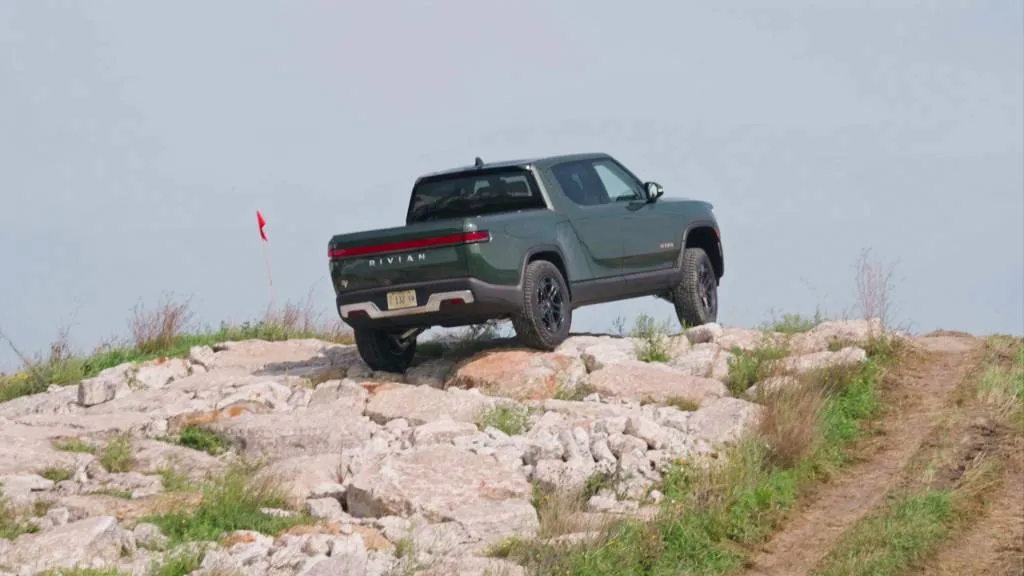
Rivian plant in Normal, Illinois, manufacturing its Enduro drive unit
Mercedes-Benz confirmed U.S. pricing and availability for its first electric vans, which are also due to be U.S.-made. The 2024 Mercedes eSprinter will start at $74,181, with all versions getting a 113-kwh battery pack likely to deliver more range than any other American-market electric van yet.
The upcoming 2024 Hyundai Sonata Hybrid made an official bow this week as part of a refreshed Sonata lineup. While pricing, trim details, and mpg remain yet to be disclosed, look for paddle-shifters and adjustable regenerative braking as part of a sportier yet potentially more efficient experience—as well as a new panoramic curved display inside, with the shift lever moved behind the steering wheel to free up more cabin space.
According to an annual roundup from the Insurance Institute for Highway Safety (IIHS) and its Highway Loss Data Institute (HLDI), electric vehicles are stolen far less frequently than gasoline models. As for why exactly that’s the case: It might have something to do with where EVs are parked for charging.
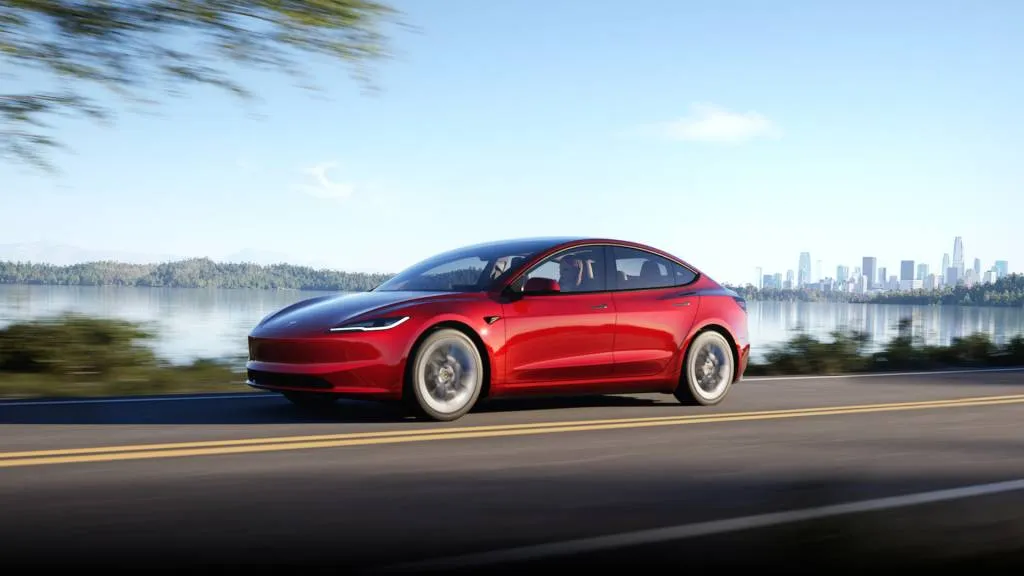
Tesla Model 3 (Europe-market refresh)
Tesla on Thursday night revealed a revamped version of the Model 3 for Europe. Although it’s about the same dimensions as the outgoing version, a design and styling refresh improves aerodynamics. What Tesla calls an all-new interior doesn’t look all that much different than the current version, but upgraded materials, ventilated front seats, and revamped infotainment and premium sound could go a long way. There’s no word yet on how EPA range might change with these models—or even, at the time of writing, when they’ll be offered in the U.S.
Rivian disclosed that its R1T with the 180-kwh Max pack achieves up to an EPA-cycle 410 miles. Deliveries for the first Max pack models are due later in the year.
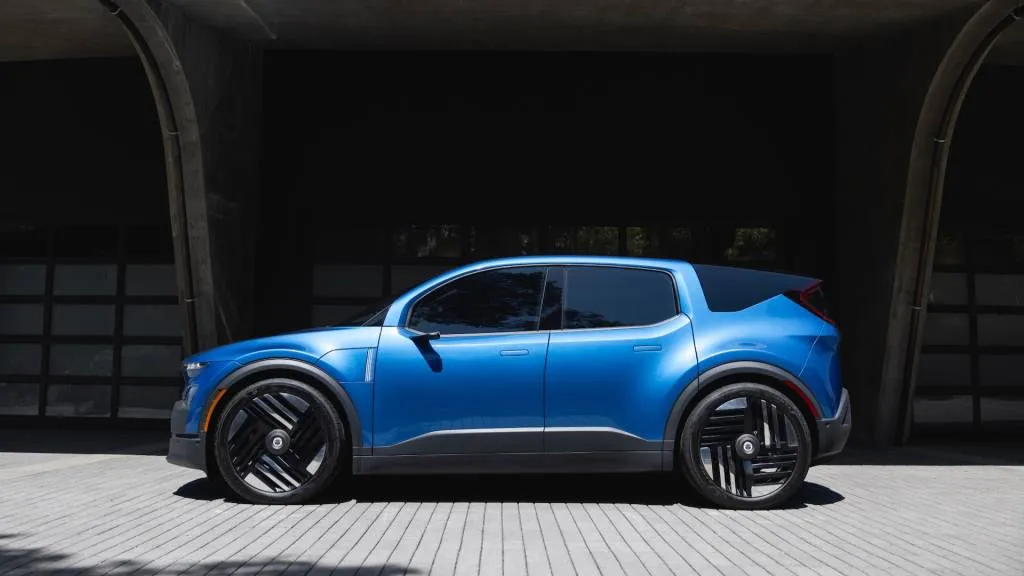
Fisker Pear
Fisker has revealed a few new details regarding its upcoming $29,900 Pear urban EV. The Pear will offer 180 or 320 miles of range, Fisker claims, from two different battery packs. All-wheel drive and an Extreme performance model are also in the works. The model, with seating for up to six and a unique “Houdini trunk” arrangement, could provide a much-needed shakeup for small-car packaging norms.
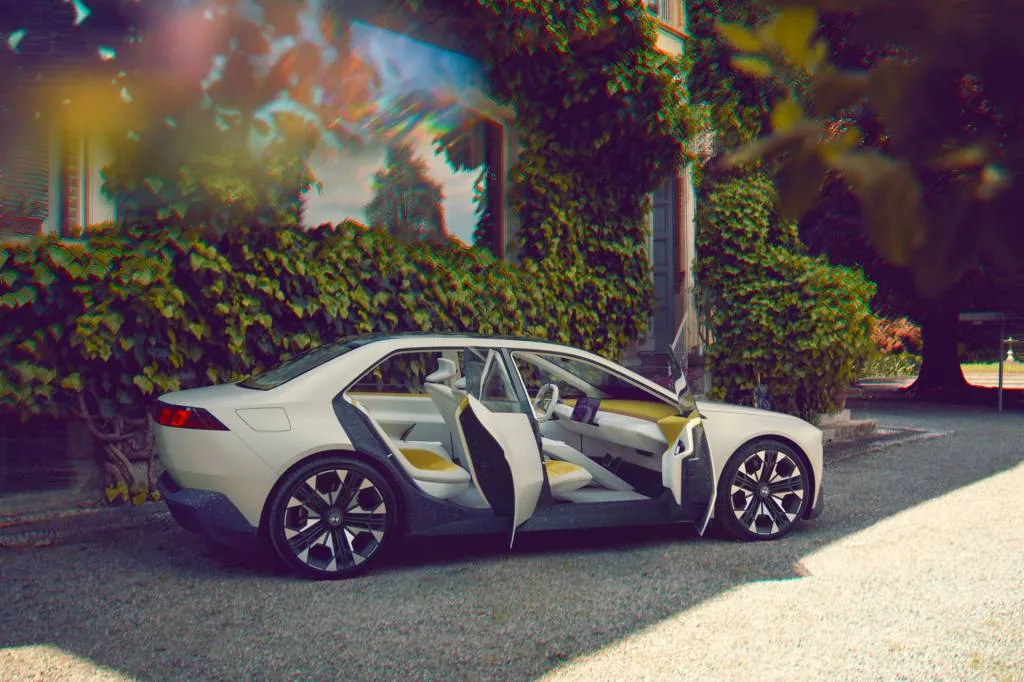
BMW Vision Neue Klasse
The Munich auto show has brought the introduction of several EV models that dig deep in respective brands’ design heritage—rather than attempting to remake all the design cues as part of it. The BMW Vision Neue Klasse offers up a design that’s simultaneously a throwback to the E30 3-Series with a much-simplified interface, plus next-generation EV tech that promises more range, faster charging, and more efficiency. And the Volkswagen ID.GTI Concept EV offers up how VW plans to re-up its fun-to-drive compact car for the electric era.
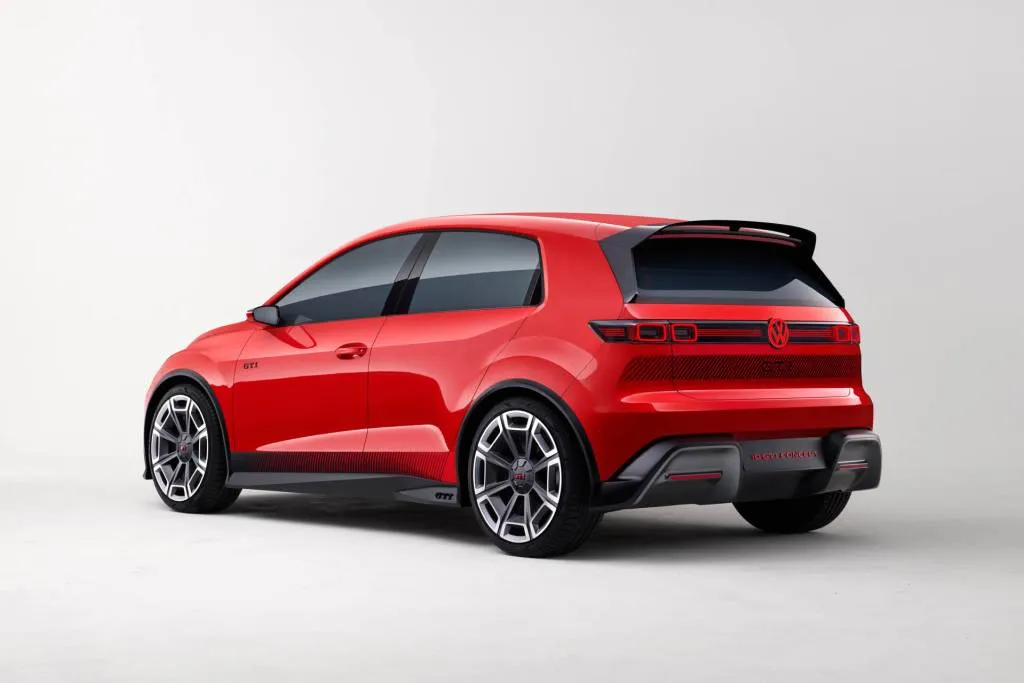
Volkswagen ID.GTI Concept
Also at the show, Mini showed the first of a future lineup of EVs taking form. Its upcoming Mini Cooper and Countryman electric models, badged E or SE, will get a lot more range than the present-day Mini Cooper SE, as well as a simplified interface focused around a round central display screen with available head-up display. These models’ exterior designs look much like their predecessors though.
Audi is delivering 300 EPA miles for its Q8 E-Tron, as promised. But as official EPA ratings reveal, that’s for the sleeker Sportback version. The Audi Q8 E-Tron SUV gets 285 miles, made possible through a larger battery and efficiency improvements versus its E-Tron SUV predecessor.

2024 Audi Q8 E-Tron
A potential issue in 2021-2023 Hyundai Elantra Hybrid sedans could cause them to accelerate unintentionally. It’s led to a recall for what the automaker describes as a “motor synchronization fault,” but brakes are still operational and acceleration is gentle so Hyundai is suggesting these models are still drivable until the recall fix.
In Texas, Tesla Powerwall owners are helping support the grid. As part of a pilot project initially affecting two regions around Houston and Dallas, Powerwall owners will sell surplus power when needed to the grid—forming “virtual power plants” that can eliminate the need for “peaker” plants at peak use times.
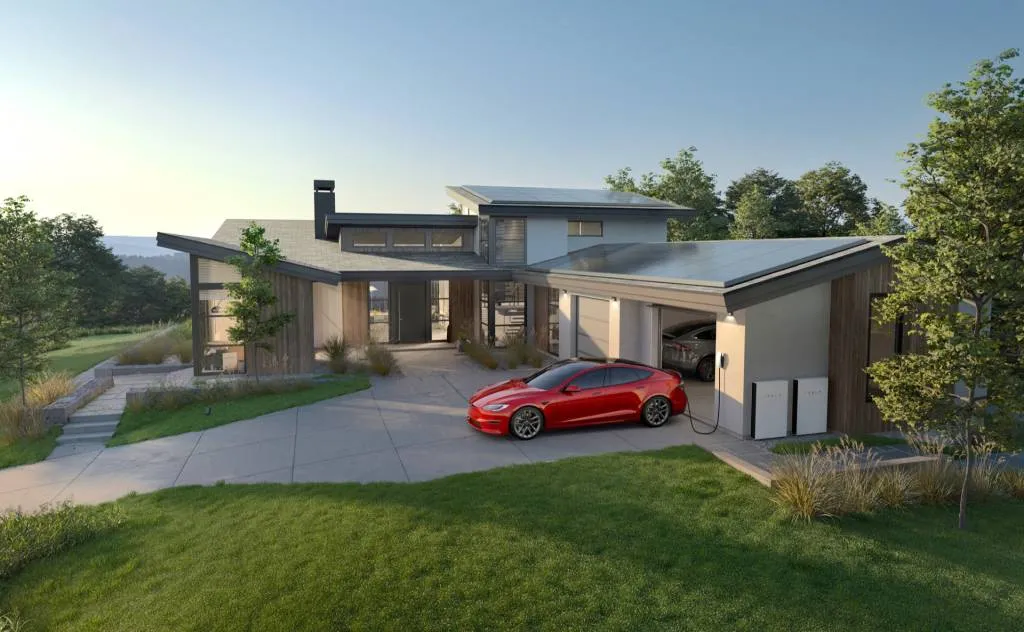
Tesla Powerwall – Courtesy of Tesla, Inc.
Does frequent fast-charging degrade EV range over the long term? A study from Recurrent, which tracks the battery health of used EVs, finds that isn’t necessarily the case—if you have a Tesla. Looking at thousands of Tesla vehicles and comparing vehicles that were fast-charged 90% of the time vs. those that were fast-charged less than 10% of the time, it found “no statistically significant difference in range degradation.” That said, following some simple advice we include on what not to do at those charging stops might help assure your battery pack lives long.
As an American EV fast-charging network is being put together by seven automakers, including Mercedes-Benz, the German automaker confirmed Monday that its upcoming Mercedes’ High-Power Charging Network will be “an additional key component of the company’s overall electrification strategy”—meaning it will be differentiated from and in addition to the other effort. Mercedes’ own network will include more than 2,000 DC fast-charging connectors by the end of 2024, located at Charging Hub oases.
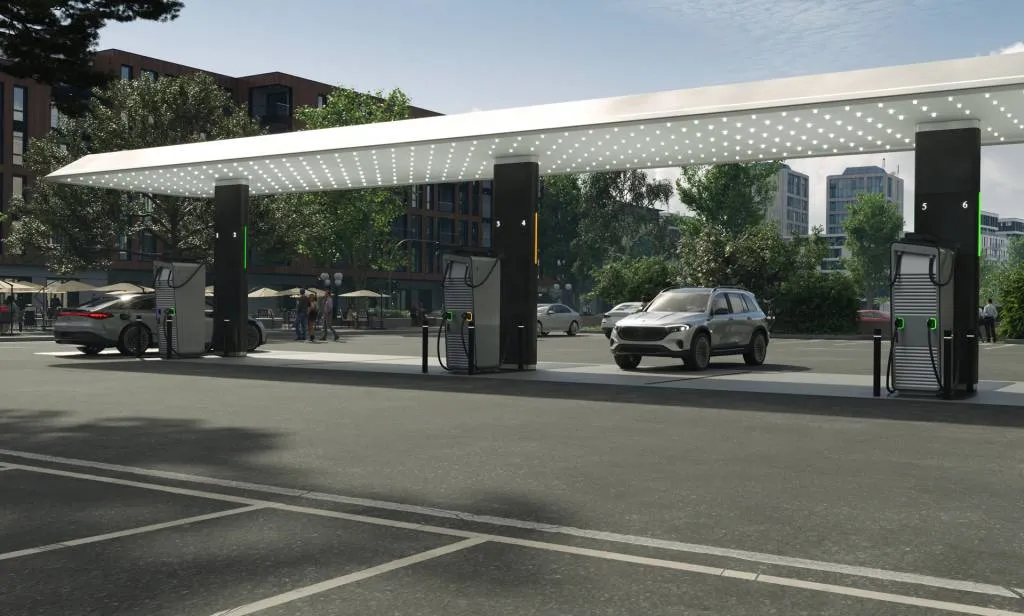
Mercedes-Benz EV charging station
A U.S. hydrogen economy doesn’t truly exist yet, but it’s starting to ramp up around hydrogen incentives that haven’t yet been defined by the federal government. While some suppliers such as Bosch are readying efforts to produce equipment like electrolyzers, the end-use carbon footprint of products using hydrogen will depend on how true green hydrogen, from renewables and not natural gas or methane, will be incentivized.
Despite targets seeking EVs as the bulk of sales some years ahead and, even in some cases, end dates for internal combustion models, several full-line automakers are quietly fighting EV-focused EPA emissions targets. In GM’s case, that appears to mean fighting the lower tailpipe emissions limits themselves.
And EVs are 5% or more of the new-vehicle market in 23 countries, with five of those countries reaching the threshold this past year. Using a whole range of technology adoption and the commonly-referred-to S-curve as a basis, that’s widely seen as the point at which EV sales accelerate. But factors like cost and charging infrastructure could mean that EVs are different.
_______________________________________
Follow EV kind of cars on Facebook and Twitter
Electric cars news.



